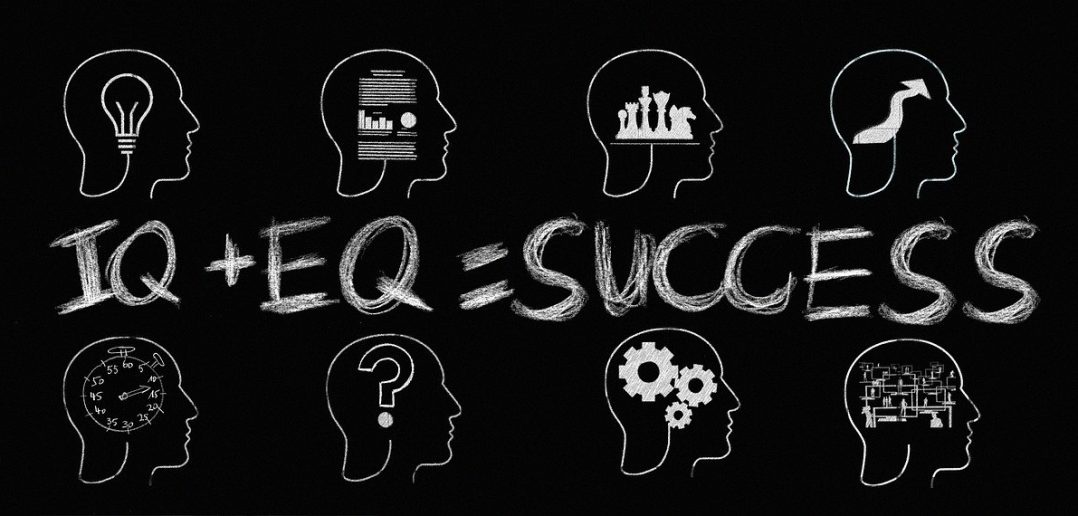Finding the right EQ resource can help boost resilience and Mental Health in sales. As a result, when you improve these areas your sales performance will accelerate.
According to research done by Daniel Goleman, IQ helps determine your career success and the type of job you will hold. For example, it usually requires an IQ of about 115 to handle the cognitive complexity facing an accountant, physician or a top executive.
Past an IQ of 115 – it is no longer an effective measurement of who will be a productive and engaged employee. This is when EQ starts to matter more because future success in high IQ roles depends on relationships.
Soft skills like empathy, self-awareness, discipline, social-awareness and the way you regulate emotions will help you build meaningful relationships. Relationships that will help you climb the corporate ladder and effectively lead a team.
But is the same true for sales?
What is IQ?
IQ is defined as an Intelligence Quotient. It measures your reasoning ability and how well you can use information and logic to answer questions. With a higher IQ and cognitive ability you’ll be able to make better predictions and problem solve effectively.
This means early success as an accountant or doctor requires sound logic and using data to problem solve. It means following a logical mathematical processes in Excel or reading health data to make an accurate diagnosis. It’s only later in their careers do relationships become more important in determining future success.
In sales the opposite is true. One may even argue that sales is a Low IQ, High EQ sport; especially given the low complexity of most products being sold today.
Only once a sales rep advances to a sales leadership position does forecasting accurately (important as a sales rep, but not as important) and using data to problem solve become a critical part of the role. This means early success in sales is highly dependent on your ability to build meaningful relationships with buyers and your peers.
Rarely are problems in sales being solved with logic.
If the product you’re selling is truly the “best on paper” then it would be logical for everyone to buy your product. This almost never happens because buying decisions are rooted in emotion. Salespeople need to build trust and connect with these buyer emotions in order to understand how their product will help.
Only then will a sale take place.
Objections, problems and setbacks in sales are being solved with emotion, which means higher levels of EQ are needed to succeed.
Why an EQ Resource is Important to Mental Health in Sales?
According Harvard theorist Howard Gardner – “Your EQ is the level of ability to understand other people, what motivates them and how to work cooperatively with them.” This ability is typically broken down into five different categories:
- Self-Awareness
- Self-Management/ Self-Regulation
- Motivation
- Empathy
- Social Awareness/ Relationship Management
Developing these five areas help build effective sellers. They will also help you take better care of your Mental Health. Sales is ripe with failure and emotional trigger events that happen on a regular basis. Improving skills like your self-awareness and self-regulation will help you better understand your own emotions, how they impact others and find ways to control them better.
When we take care of ourselves first, we’re able to take better care of others – including our customers.
EQ Resource for Salespeople
The best part about EQ is it is not fixed. Similar to how you can improve your sales pitch with practice, you can develop your EQ by building skills in the five categories above. With the right EQ resource, you can improve your EQ to become a better salesperson, colleague, friend, partner, parent and leader.
Most sales teams invest the majority of their training time and budget into developing a sales person’s craft. Teaching them skills like how to ask better questions or effectively negotiate a deal.
Rarely is EQ and Mental Health prioritized in their skill development even though they are the primary drivers of success. A sales rep will never be able to ask the right questions or negotiate effectively without high EQ or good Mental Health.
With any type of personal development and training, measurement helps you see meaningful progress in your skill development. When we’re able to see progress, we’re more likely to stay motivated.
To help with this – I’ve found a really awesome free EQ test you can access here. The EQ test will give you a good baseline measurement of your EQ.
Once you’ve completed the test, stop waiting for your sales organization to catch-up. You’re in control of your Mental Health, EQ and sales performance. I’ve included several best practices and strategies to help you improve these areas in the online course I’ve created: Improve Sales Performance, Resilience & Well-Being Through Better Mental Health.
To ensure you do not miss future posts like this one – consider signing up for the weekly newsletter below. Each week I’ll share best practices to help improve sales performance through better Mental Health.
About The Author

Jeff Riseley is currently the Founder of the Sales Health Alliance and Mental Health Advocate. With over a decade of sales experience – Jeff understands the importance of Mental Health in achieving peak sales performance.
Jeff combines his sales (Sales Knowledge Institute) and Mental Health expertise to improve sales performance through a mix of sales mentorship and mental health best practices. His strategies have helped sales teams improve their sales process, while helping them become more motivated, resilient and better equipped to tackle stressful events within sales.
He is currently delivering these strategies through on-site workshops, coaching and speaking engagements. To explore working with Jeff contact him at [email protected]




